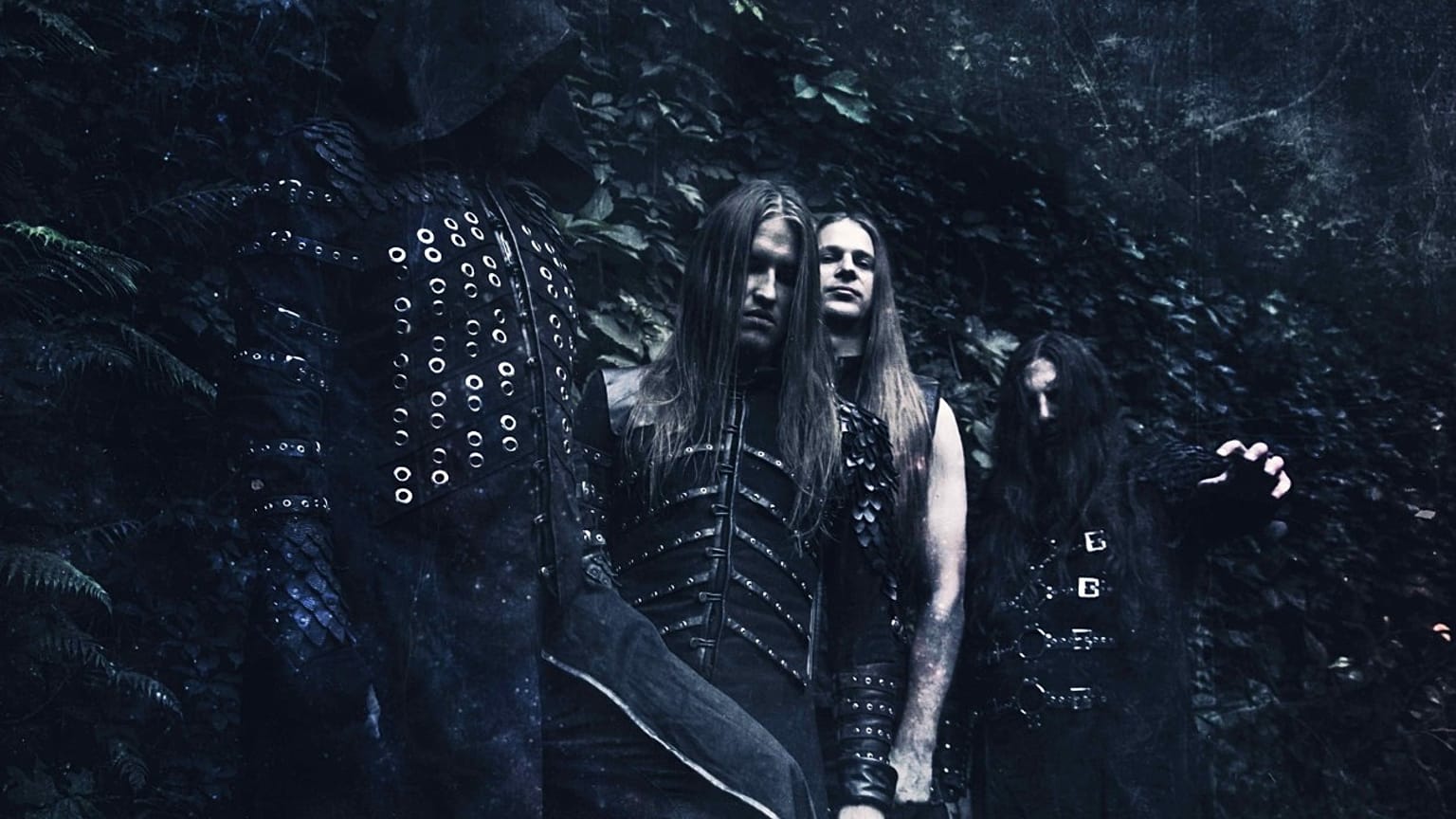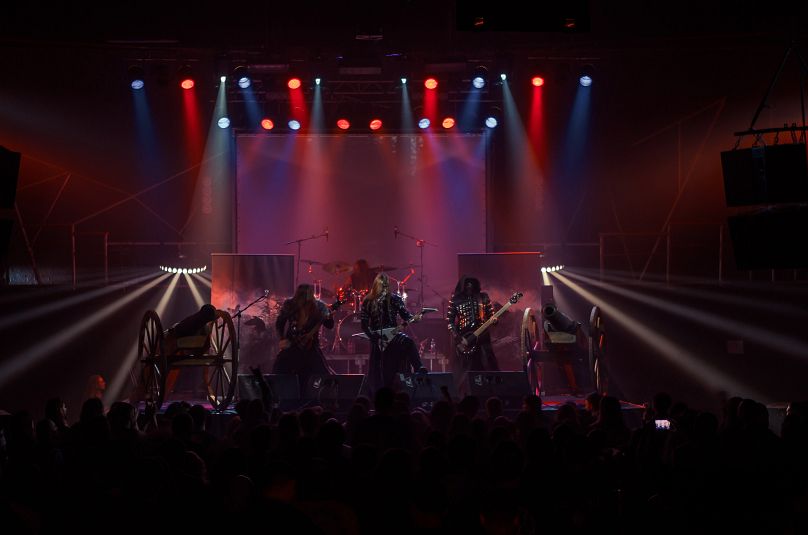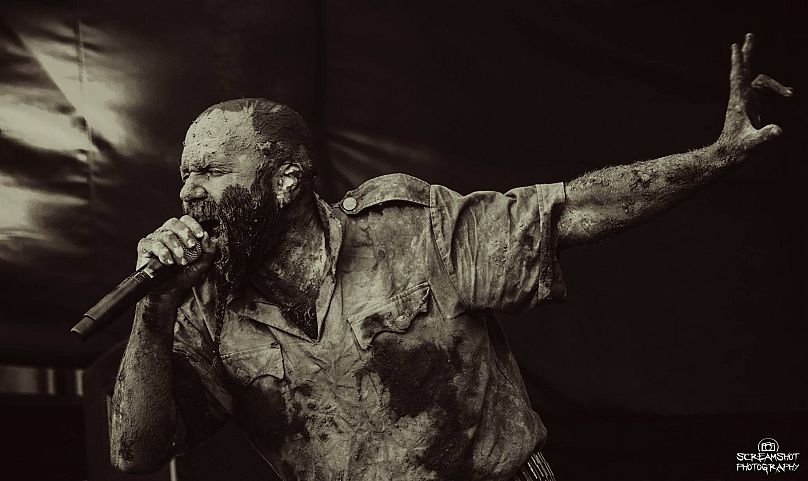'You can't be an apolitical musician in Ukraine,' says Konstantin 'Khaoth' Zmievsky, the drummer of Ukrainian black metal band Khors.
Life in Kharkiv, Ukraine, could have turned out very differently.
 ADVERTISEMENT
ADVERTISEMENT
 ADVERTISEMENT
ADVERTISEMENT
Back in 2014, when Russia annexed Crimea and its proxies took over swathes of eastern Ukraine, including the cities of Donetsk and Luhansk, residents of Kharkiv - just 40 kilometres from the Russian border - feared that their city would be next.
Like the rest of Ukraine, Kharkiv has had a complicated history with Russia, dating to before the time of Peter the Great. It was conquered by the Bolsheviks in 1917, but changed hands no less than six times between Russia’s new government and Germany during World War One.
Capital of the Ukrainian Soviet Socialist Republic from 1919, Kharkiv suffered during the 1930s, first during the devastating Holodomor famine - which killed millions of Ukrainians - and then during Joseph Stalin’s brutal purge of intellectuals and dissidents during the 1930s.
Captured by the Nazis in 1941, Kharkiv was almost completely destroyed during World War 2 and tens of thousands of citizens - including 15,000 Jews - were killed. After the war, Ukraine remained part of the Soviet Union until independence in 1991.
Following the Maidan protests in 2014, pro-Russians in Kharkiv briefly raised a Russian flag on an administrative building and attempted - as their compatriots in Luhansk and Donetsk - to proclaim a Kharkiv People’s Republic. Ukrainian security forces quickly put down the protest.
The war between Russian-backed separatists and the Ukrainian government in the neighbouring Donbas has raged ever since. For residents of Kharkiv, to the north of the contested region, it has served as a warning of what could have happened to them.
“Kharkiv was saved from the separatist plague that nearly turned our city into an unrecognised enclave of the Russian Federation. The way it happened with Donetsk and Lugansk,” said Konstantin Zmievsky, a Kharkiv native who now lives in Kyiv.
Konstantin is a member of Khors, one of only a handful of Ukrainian black metal bands that have achieved international recognition. As a genre, black metal - which originated in Norway - is the most extreme of the sub-genres of heavy metal, defined by fast, distorted guitar riffs, growled or screamed vocals and the so-called ‘blast beat’ technique of drumming.
It has also, traditionally, been heavy metal’s most controversial genre. Ever since the 1990s, when members of a handful of Norwegian bands were implicated in a string of church burnings and grisly murders, black metal’s embrace of extreme ideologies - mostly infamously, Satanism - and uncompromising musical style has fascinated and horrified the public in equal measure.
Since the 1990s, the genre has spread worldwide with black metal bands everywhere from Saudi Arabia to Columbia to China and Japan. Not all black metal musicians are Satanists: Many draw influence from politics, extreme left and, controversially, extreme right too. Some focus on environmentalism, others on social movements. Some aren’t political at all.
Khors are, though, and Konstantin doubts that after the last six years in Ukraine there are very few bands that are not.
“We don’t have apolitical bands here in metal anymore. Not just in metal, you can’t be an apolitical musician. You can’t be apolitical in Ukraine,” he said. “After the Russian invasion and the occupation of Ukrainian territories in Donbas and Crimea.”
But the focus of Ukrainian black metal bands on the history and culture of their nation is not a new phenomenon. Perhaps the best known of the Ukrainian bands internationally, Drudkh, based its 2005 album ‘The Swan Road’ on the work of Tara Shevchenko, a Ukrainian poet and national hero who was persecuted and exiled for his work and died in 1861.
Questions of nationalism
Drudkh was founded by Ukrainian musician Roman Saenko, a famously reclusive figure on the metal scene who has never given an interview. The band's 2006 album Blood in Our Wells was dedicated to Stepan Bandera, the radical founder of the Organization of Ukrainian Nationalists (OUN), alleged Nazi collaborator and one of the most divisive figures in Ukrainian history to this day.
It is the nod to Bandera that has fuelled allegations that Drudkh, and Ukrainian bands more generally, belong to - or at least have links with - a sub-genre of the black metal sub-genre known as National Socialist Black Metal (NSBM). Saenko’s earlier bands, Hate Forest and Astrofaes, have both been linked to the far-right music scene.
Many Ukrainians point out that it has long been a technique of Russia and its proxies to paint Ukrainian nationalism as extreme right or fascist, and that nationalism in Ukraine was not - and is not - fascist, rather it is a political and cultural reaction to the persecution and even genocide that Ukrainians have suffered at the hands of the Russians, Poles and the Soviets throughout history.
Others say that is apologism, that nationalism is by its nature exclusive and usually violent, and that whatever Bandera - who was made a ‘Hero of Ukraine’ in 2010, to howls of international protest - and his ilk did to further the cause of Ukrainian independence, their willingness to, for example, work with the Nazis against the Soviet Union during WW2 was inexcusable.
Given Saenko’s silence during his long career - and the fact that understanding black metal’s screeched lyrics is, even to fans, largely impossible - the metal world will likely never find out whether one of Ukraine’s most famous black metal musicians harbours far-right beliefs.
But Konstantin, who played in two of the bands in question, is sceptical.
“You know, I played with Astrofaes from 1996 to 2000, for four years, and we played black metal with black metal style of lyrics and we’ve never been interested in national socialism or neo-Nazis and stuff like this,” he said.
“Later, I joined Hate Forest [...]. I played with them for maybe two years, we played only one show. I know the guys very well and they’ve never been Nazis or neo-Nazis.”
Where the World Acquires Eternity
There were bands in Kharkiv, Konstantin admits, that did have right-wing views. On a close-knit scene, there were times when musicians from those NSBM bands may have played in other, non-NSBM bands. Or times that labels that produced right-wing bands also produced and released albums by non-racist bands. This is the case in other countries too, Konstantin said, such as Poland - but unlike Poland, it has led to every band out of Ukraine being labelled racist.
“You can find on the internet that Khors is a Nazi band, which it is not,” Konstantin said.
Khors’ latest album - released on September 15 - is their second concept album after 2012’s Wisdom of Centuries, which is based on the history of the Kholodny Yar Republic, the last bastion of pro-independence Ukrainians between 1918 and 1922. A peasant, Cossack state, the republic was eventually overcome and subsumed into the Soviet Union.
The new album, Where the World Acquires Eternity, is based on the history of Kharkiv, and an apartment building that in the 1920s housed some of Ukraine’s most revered writers, poets and intellectuals. Although it began as a utopian dream for the Kharkiv intelligentsia, the ‘Slovo House’ eventually became a prison and many of its residents died during the Stalinist purges.
Although Konstantin had lived around the corner from the building when he was in Kharkiv, he didn’t know the history of the Slovo House until four years ago, as he made preparations for his wedding. As a way of getting to know his in-laws, who are from Lviv, he arranged a tour for the family of Kharkiv. It was the tour guide that pointed the Slovo House out.
“I had lived in Kharkiv for 30 years but I never knew many stories behind the buildings and the streets. She told the story about the Slovo [...] and it was a new story for me. I dived deeper into that story and found very interesting and sad history,” he said.
The arrests of the first of the Ukrainian intelligentsia began in 1932 and by 1940, residents in 40 of the 66 apartments had become victims of Stalinist persecution, many were arrested and executed. During the German occupation of Kharkiv, the apartment building once dreamed of as a creative hub for Ukraine’s brightest and best became the military quarters for Nazi officers.
For Khors, it is the tragedy of the Slovo House - a dream crushed by violence and tyranny - that makes it so relevant today, at a time when the future of independent Ukraine is once again threatened by a powerful force from the east.
“It is about our city, about our history, and it is about Ukrainian history,” Konstatin said.
“Why now? Because after 2014 everything related to Ukraine in Kharkiv is especially sensitive. All this stuff combined together in us.”
On the other side of Ukraine, in the western city of Lviv, Ditmar Kumarberg is another musician who has sought inspiration from history for his music. Although in the case of Kumarberg - and his band, 1914 - it is not Ukrainian history that has served as subject matter.
Former in 2014, 1914 has based its black metal on World War I, releasing its first album Eschatology of War in December 2015 and its second, The Blind Leading the Blind, in 2018, on November 11, the day the end of the conflict is marked every year.
Although songs on the band’s albums are based on famous battles at Verdun and Gallipoli, the German bombing of London and battles between the Russian and Austro-Hungarian armies, Kumarberg makes the point that Ukraine by no means escaped the violence of World War One.
“All kind of troops were here: Russian, German, Austro-Hungarian, Ottoman, Belgian, Romanian,” he told Euronews. “I dig up those dead soldiers – skeletons, with uniform, weapons, ammo, with all the stuff, and write songs about their fate, silent death and fear.”
But while his own interest lies in the First World War, Kumarberg - whose stage name is Oberleutnant Ditmar Kumarberg, from Infanterie-Regiment Nr.147 - understands the focus on Ukrainian history by bands like Drudkh and Khors.
Ukraine has spent four centuries being invaded, carved up and dominated by other empires. It has suffered violence, slavery, totalitarianism. Little wonder that while bands in Scandinavia have to find their evil in ideologies such as Satanism, Ukrainians just look to the past.
“All of this, all of this history mix, [...] all this madness raised our black metal scene, as a protest,” he said. “In Norway or Sweden, they are singing about Vikings and burning churches. Here our black metal bands sing [...] about this slavery, their defeats, about our land.”
















